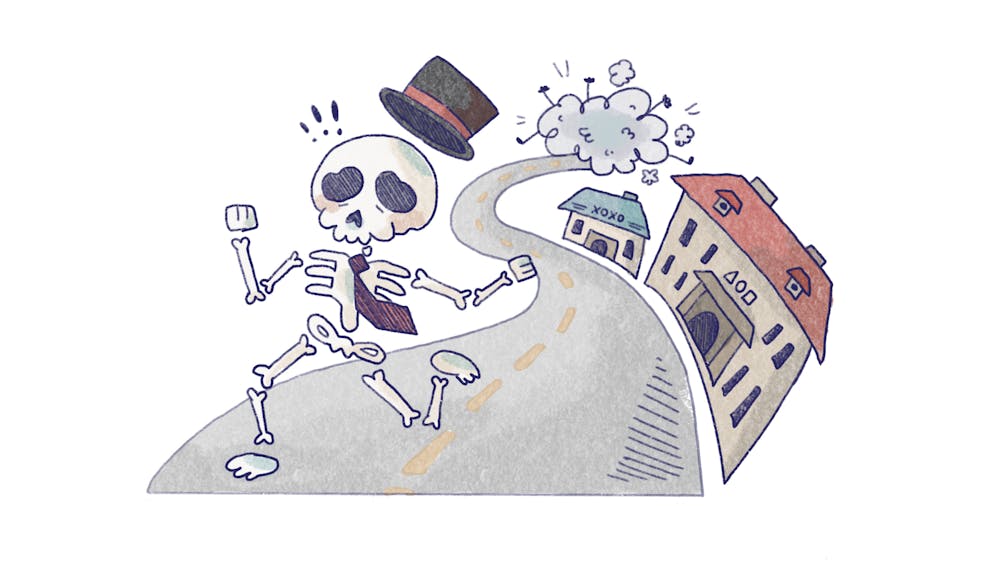I was 14 when “DAMN.” (2017), Kendrick Lamar’s last album, came out. I begged my parents for $9.99 to buy the album on iTunes and sat in anticipation as the music downloaded. Lying in a hotel in Tucson, Arizona, in typical Lamar fashion, the protagonist of “DAMN.” was unexpectedly killed off in the first song. Terrified, I listened to the rest of the album, staring up at the popcorn hotel ceiling in shock. A blossoming fanatic, I was perplexed, terrified and, yes, addicted.
Five years later, on May 13, Lamar released “Mr. Morale & the Big Steppers.” I listened, again, in a hotel room, immersed in the new sounds that Lamar had given us.
Whenever Lamar drops music, listeners should be aware that immense artistic precision has been directed into the piece, and “Mr. Morale” is no exception. From the introductory track “United in Grief,” Lamar returns with an intricate and complex entrance back into the mainstream, analogous to the sonic chaos developed on Radiohead’s “Kid A.” Stepping back onto the stage as a new character, Lamar sounds conflicted, hurt and lost, turning to therapy to address trauma. As the album plays, listeners may realize that each track represents a different therapy session, each targeting various significant issues through the semi-fictional protagonist, Mr. Morale.

Kodak Black serves as a narrator and tour guide through the winding path of the album. The artist’s inclusion is highly controversial, as he was convicted of sexual assault in 2016. Kodak also identifies as a Black Hebrew Israelite, which is likely a significant reason for his symbolic inclusion on the album. Many questioned whether Kodak should be allowed to capitalize off of such features in light of his abusive history, but this theme of forgiveness through religion is probably a key reason for his inclusion as narrator, whether justified or not.
Family issues are the most prevalent topics throughout the album. In the fantastic “Father Time,” Lamar details the masculine expectations his father planted throughout his childhood, recalling when, “His momma died, I asked him why he goin' back to work so soon?/ His first reply was, ‘Son, that's life, the bills got no silver spoon.’” Lamar turns his experience into a teaching moment, encouraging other fathers’ “blessings be neutral to your toddlers.” Such acceptance of non-traditional gender roles and family dynamics is uncommon in hip-hop, yet Lamar’s activism persists later in the album, shedding light on topics rarely addressed in the genre.
In “Auntie Diaries,” Lamar recalls his ebbing relationship with his transgender uncle in scenic detail. One of the first mainstream rappers to publicly extend support to the transgender community, Lamar details his growth in understanding his relative’s identity. Simultaneously, Lamar, an artist well known for his Christian faith and religious themes, directly questions the dilettantish tendency of organized religious communities to ostracize LGBTQ+ members. When his cousin is called out publicly in church for his identity, Lamar interrupts the sermon, chiding “Mr. Preacherman, should we love thy neighbor?/ The laws of the land or the heart, what’s greater?” Through one song, Lamar explains his evolution in thinking from blind follower to thoughtful advocate.
However, his lyrical choices are controversial and have offended some fans, specifically in his use of an anti-gay slur. This decision divided many of his listeners, with several claiming he is not justified in using the word. Some listeners believe that “Auntie Diaries,” and likely more of “Mr. Morale,” is another fictional story, and should be treated as such. In a Variety review, Jem Aswad notes Lamar’s career-long tendency to “criticize his own biases and prejudices” instead of placing himself above the people he singles out. In the context of “Auntie Diaries,” Lamar humanizes himself in this manner by pointing out his own mistakes and shortcomings in relation to the acceptance of queer people. The New York Times review of the album has less patience for Lamar’s lyrics, calling his attempts “earnest but clunky” and his use of the slur a “faux pas.” While polarizing, this conversation fits into the larger debate around artistic freedom and acceptance of marginalized groups. Lamar further embraces trauma in his family later in the album.
In his most vulnerable song, “Mother I Sober,” Lamar reflects on the introspection he has gained in therapy. In his self-reflection, I find Lamar speaking differently than he has in his past work. Where he used to claim himself a prophet, a voice to influence the actions and values of his community back home, he now more often sees his own flaws and imperfect family history. In “Mother I Sober,” he delves into memories of his family’s experiences with abuse, which having been bottled up for years are now resurfacing through his therapy.
Turning the conversation toward collective problems, Lamar uses the prevalence of abuse in Black families as an explanation for certain phenomena in hip-hop and Black culture, poetically prophesizing: “I know the secrets, every other rapper sexually abused/ I see 'em daily buryin' they pain in chains and tattoos.” Such a narrative realization may explain Kodak Black’s presence on the album. Soon after, Lamar speaks in what can only be described as an exhausted voice, sounding as if someone else is speaking through him, setting free himself, his family and “all you abusers.” Lamar finally embraces the Christian philosophy he has lauded throughout his career in this forgiveness. With the Mr. Morale character, Lamar creates a new role for himself. As opposed to some of his past protagonists, he embodies Mr. Morale most personally, confidently addressing his flaws rather than hiding behind motifs and masks, as he has in the past.
Kendrick Lamar is inarguably a generational artist, and with “Mr. Morale” and its intimate, theatrical feel, we are gifted seats to watch his personal musical production. Lamar no longer seems interested in tap dancing for the audience, and as the curtains begin to close on his monumental career, I wait patiently for the encore.








